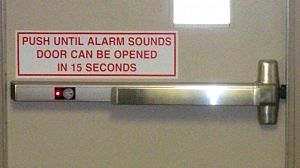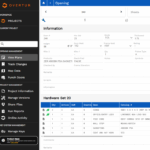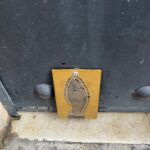A few years ago I met Brad Keyes of Keyes Life Safety Compliance, who is a terrific resource when it comes to life safety questions about health care facilities. When I received the question below I sent it to Brad, and his answer was so comprehensive and helpful that I asked if I could post it here. It is relevant to all types of health care facilities, not just ambulatory health care. Thank you Brad, for allowing me to share this information!
 Question: One of our specwriters is working on a project – an Ambulatory Health Care facility, and they would like to use a delayed egress lock on an interior door. The 2000 edition of NFPA 101 – The Life Safety Code limits special locking arrangements to exterior doors in Ambulatory Health Care, but the 2012 edition of NFPA 101 does not include that limitation. I know that the Joint Commission and the Centers for Medicare and Medicaid Services (CMS) currently require facilities to comply with NFPA 101-2000, but I have read that they will soon change to the 2012 edition of NFPA 101. I have also seen a letter stating that waivers are not required for some circumstances where facilities would like to use an application allowed by the 2012 edition that was not allowed by the 2000 edition. What would you advise?
Question: One of our specwriters is working on a project – an Ambulatory Health Care facility, and they would like to use a delayed egress lock on an interior door. The 2000 edition of NFPA 101 – The Life Safety Code limits special locking arrangements to exterior doors in Ambulatory Health Care, but the 2012 edition of NFPA 101 does not include that limitation. I know that the Joint Commission and the Centers for Medicare and Medicaid Services (CMS) currently require facilities to comply with NFPA 101-2000, but I have read that they will soon change to the 2012 edition of NFPA 101. I have also seen a letter stating that waivers are not required for some circumstances where facilities would like to use an application allowed by the 2012 edition that was not allowed by the 2000 edition. What would you advise?
Brad’s Answer: You are correct: The 2012 edition of the Life Safety Code (LSC) did away with the limitations of the special locking arrangements found in 7.2.1.6. Section 20/21.2.2.2 of the 2012 edition now permits delayed egress locks on any door in the path of egress, where the 2000 edition of the LSC limited them to the exterior door.
So, based on your question, I am assuming the person who asked you the question must be bound by the 2000 edition of the LSC, such as a Joint Commission accredited organization, or perhaps a CMS provider for Medicare. The initial thought is the organization would have to comply with the conditions of the 2000 edition of the LSC, and cannot take advantage of the more lenient 2012 edition until such time that edition is adopted by CMS and/or Joint Commission.
However, as you alluded to, CMS did issue a categorical waiver to healthcare organizations to allow them to use many of the provisions of the 2012 edition of the LSC now, before the 2012 edition is actually adopted (which I suspect will be at least another 12 months away). I reviewed the S&C memo 13-58 (available here) once again, and while CMS did state in one of their opening paragraphs that they have the authority to grant waivers for ambulatory surgical centers (see highlighted section on page 1), they failed to do so in the body of their memo. They have a categorical waiver on doors to allow healthcare occupancies to use the more liberal 2012 LSC position on delayed egress locks, but that categorical waiver only applies to healthcare occupancies, and not ambulatory surgical centers (see highlighted section on page 4).
Therefore, I conclude that the organization who inquired about this issue, should (or must) comply with the 2000 edition of the LSC and only install special locking arrangements on exterior doors. Once the 2012 edition of the LSC is adopted, they can then install delayed egress locks on interior doors.
If the facility in question is only accredited by Joint Commission, and does not receive any funds from CMS as a Medicare or Medicaid provider, then I would suggest they contact the Standards Interpretation Group (SIG) at Joint Commission and ask if they would accept a Traditional Equivalency to allow them to use special locking arrangements on interior doors of their ambulatory care occupancy. The telephone number for SIG is: 630-792-5900, select option 6. My guess is they will, provided the organization meets all the requirements for a traditional equivalency.
If the facility in question actually is part of a larger organization that does have a CMS certification number (CCN), then they have no choice by to comply with the conditions of the 2000 edition of the LSC. There is a waiver process, but CMS will not accept a waiver request unless it is in response to a survey deficiency. In other words, the waiver process is not valid until someone representing CMS cites a deficiency.
As a safety professional, I would never recommend or advise a client to knowingly violate the current edition of the LSC, even though we know that issue will be viewed differently in a more recent edition. There is always the chance that CMS may not adopt the 2012 LSC, although I would be very surprised if they did not.
However, the client organization may do what they want, and often times they disregard the advice of a safety professional, and violate the LSC, taking the risk that they will not get caught. In this case, it is understandable as the presumption is the 2012 edition will be effective within the next 12 months or so, and they may feel they will not have any surveys or inspections before then.
So… in summary: The waiver process is not available to them since they have not been cited for non-compliance with the LSC. As a safety professional you should not advise them to violate the LSC. What they do after that is their own business, and risk.
To read more on what Brad has to say about healthcare compliance, follow the postings on his blog at www.keyeslifesafety.com.
You need to login or register to bookmark/favorite this content.





I am curious if there has been any update, or if you know of any new information regarding the adoption of LSC 2012 by CMS? It has been a little while since this was posted.
Hi Brian –
As far as I know, CMS has not released a date when this change goes into effect. Hopefully soon!
– Lori